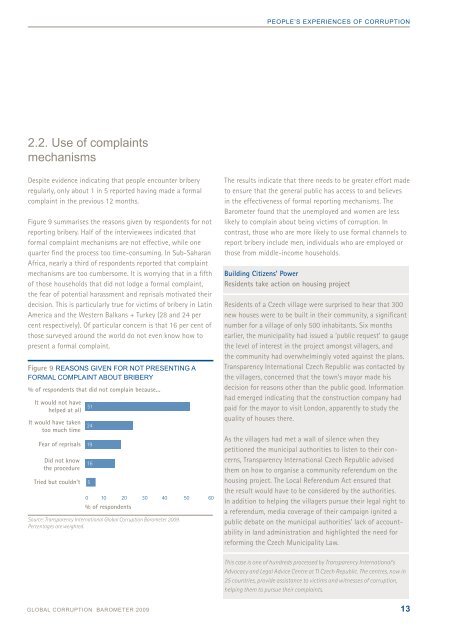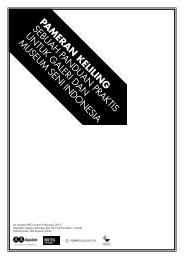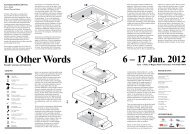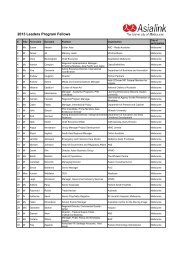GLOBAL CORRUPTION BAROMETER - Asialink
GLOBAL CORRUPTION BAROMETER - Asialink
GLOBAL CORRUPTION BAROMETER - Asialink
Create successful ePaper yourself
Turn your PDF publications into a flip-book with our unique Google optimized e-Paper software.
PEOPLE’S EXPERIENCES OF <strong>CORRUPTION</strong><br />
2.2. Use of complaints<br />
mechanisms<br />
Despite evidence indicating that people encounter bribery<br />
regularly, only about 1 in 5 reported having made a formal<br />
complaint in the previous 12 months.<br />
Figure 9 summarises the reasons given by respondents for not<br />
reporting bribery. Half of the interviewees indicated that<br />
formal complaint mechanisms are not effective, while one<br />
quarter find the process too time-consuming. In Sub-Saharan<br />
Africa, nearly a third of respondents reported that complaint<br />
mechanisms are too cumbersome. It is worrying that in a fifth<br />
of those households that did not lodge a formal complaint,<br />
the fear of potential harassment and reprisals motivated their<br />
decision. This is particularly true for victims of bribery in Latin<br />
America and the Western Balkans + Turkey (28 and 24 per<br />
cent respectively). Of particular concern is that 16 per cent of<br />
those surveyed around the world do not even know how to<br />
present a formal complaint.<br />
Figure 9 REASONS GIVEN FOR NOT PRESENTING A<br />
FORMAL COMPLAINT ABOUT BRIBERY<br />
% of respondents that did not complain because...<br />
It would not have<br />
helped at all<br />
It would have taken<br />
too much time<br />
Fear of reprisals<br />
Did not know<br />
the procedure<br />
51<br />
24<br />
19<br />
16<br />
Tried but couldn’t 5<br />
0 10 20 30 40 50 60<br />
% of respondents<br />
Source: Transparency International Global Corruption Barometer 2009.<br />
Percentages are weighted.<br />
The results indicate that there needs to be greater effort made<br />
to ensure that the general public has access to and believes<br />
in the effectiveness of formal reporting mechanisms. The<br />
Barometer found that the unemployed and women are less<br />
likely to complain about being victims of corruption. In<br />
contrast, those who are more likely to use formal channels to<br />
report bribery include men, individuals who are employed or<br />
those from middle-income households.<br />
Building Citizens’ Power<br />
Residents take action on housing project<br />
Residents of a Czech village were surprised to hear that 300<br />
new houses were to be built in their community, a significant<br />
number for a village of only 500 inhabitants. Six months<br />
earlier, the municipality had issued a ‘public request’ to gauge<br />
the level of interest in the project amongst villagers, and<br />
the community had overwhelmingly voted against the plans.<br />
Transparency International Czech Republic was contacted by<br />
the villagers, concerned that the town’s mayor made his<br />
decision for reasons other than the public good. Information<br />
had emerged indicating that the construction company had<br />
paid for the mayor to visit London, apparently to study the<br />
quality of houses there.<br />
As the villagers had met a wall of silence when they<br />
petitioned the municipal authorities to listen to their concerns,<br />
Transparency International Czech Republic advised<br />
them on how to organise a community referendum on the<br />
housing project. The Local Referendum Act ensured that<br />
the result would have to be considered by the authorities.<br />
In addition to helping the villagers pursue their legal right to<br />
a referendum, media coverage of their campaign ignited a<br />
public debate on the municipal authorities’ lack of accountability<br />
in land administration and highlighted the need for<br />
reforming the Czech Municipality Law.<br />
This case is one of hundreds processed by Transparency International’s<br />
Advocacy and Legal Advice Centre at TI Czech Republic. The centres, now in<br />
25 countries, provide assistance to victims and witnesses of corruption,<br />
helping them to pursue their complaints.<br />
<strong>GLOBAL</strong> <strong>CORRUPTION</strong> <strong>BAROMETER</strong> 2009 13










